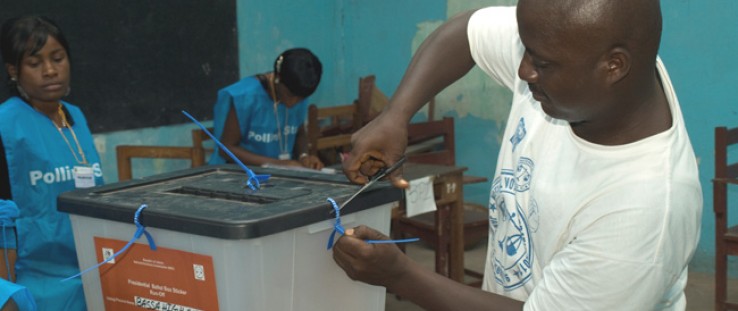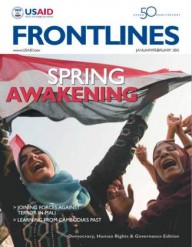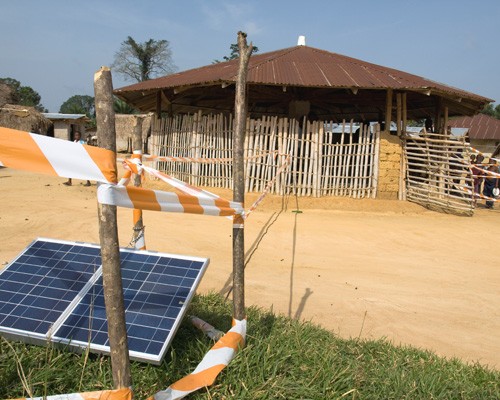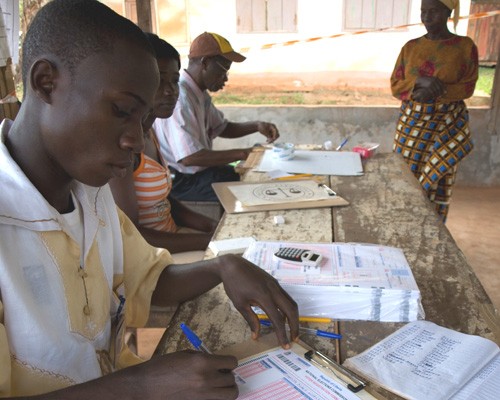 A polling station worker opens the ballot box prior to counting votes. Independent observers concluded that the 2011 elections were credible, transparent, and without evidence of significant irregularities or systematic fraud.
Justin Prud'homme, USAID
A polling station worker opens the ballot box prior to counting votes. Independent observers concluded that the 2011 elections were credible, transparent, and without evidence of significant irregularities or systematic fraud.
Justin Prud'homme, USAID
 A polling station worker opens the ballot box prior to counting votes. Independent observers concluded that the 2011 elections were credible, transparent, and without evidence of significant irregularities or systematic fraud.
Justin Prud'homme, USAID
A polling station worker opens the ballot box prior to counting votes. Independent observers concluded that the 2011 elections were credible, transparent, and without evidence of significant irregularities or systematic fraud.
Justin Prud'homme, USAID
In less than 10 years, Liberia has transformed from a country mired in strife and civil war to one that is peaceful and leading its own free and fair elections.
In the fall of 2011, Liberians went to the polls to cast their votes in presidential and general elections, which were remarkable not only for their modern, democratic procedures, but also for their modern tools like voting databases and real-time, web-based results reporting—both of which USAID supported.
When Liberia’s civil war ended in 2003—a war that claimed around 350,000 lives in the country—part of the peace agreement called for holding elections in 2005. However, at that time, the National Elections Commission (NEC) lacked the capacity necessary to carry out its mandate. The 14 years of conflict had prompted an exodus of educated professionals and halted development of the next generation of professionals, thereby decimating state institutions.
As a result, the elections were organized with the support of 280 international elections technicians, and overseen by the United Nations mission in Liberia. All of the election magistrates responsible for overseeing the legal administration of the voting process had to come from the U.N.
The election process—transparent, open, and peaceful—ushered in the promise of a new era for the country when Ellen Johnson Sirleaf won the second round, becoming Africa’s first democratically elected woman president. A former finance minister in the 1970s, Harvard-educated Johnson Sirleaf won the round with 59 percent of the vote, making her Liberia’s 24th president. USAID supported the 2005 election process through the Consortium for Elections and Political Process Strengthening.
With an eye toward the next round of legislative elections in September 2009, USAID launched a project with the International Foundation for Electoral Systems in Liberia (IFES) to help build the competence and credibility of the NEC.
Democracy and Governance Specialist Louise Fahnbulleh has worked on the project since it began, and with USAID since 2005. “The 2005 elections were very important for Liberians to get the country back on a good path,” says Fahnbulleh. “So we were all pleased when they were successful through the assistance from the international community.”
Fahnbulleh admits that the level of assistance provided exposed the limits of the NEC’s capability, but says that there was no shortage of commitment to improving for future elections. “The whole country knew that the election could not have been held without the U.N., but after the election, there were immediate steps taken to begin rebuilding Liberia’s ability to host elections on her own,” reminisces Fahnbulleh. “I can also proudly say, with all this assistance, NEC has improved drastically in managing and taking the lead in the process.”
Solar-Powered Registration
The November 2009 senatorial by-election got the program off to a quick start: USAID and IFES provided technical and financial support for the process, including procurement of ballots, indelible ink, t-shirts and caps for civic education, posters and fliers, and poll workers for election day. The program also supported a civic and voter education campaign and a candidate debate.
The two-round election was a success procedurally and, as it involved almost half the country’s voting population, an encouraging test of the election commission’s ability.
In 2011, the NEC organized and executed the first registration of new Liberian voters in 15 years. The registration was pioneering, using solar-powered equipment that allowed voters in rural areas to receive official, printed, laminated voter identification cards within minutes of registering.
USAID and IFES set up a data center for voter registration and national counting and tallying of ballots. This established fraud-detecting features that further bolstered the credibility of the NEC and the elections processes. Voter registration forms were processed rapidly at the new data center, allowing NEC officials to inform the public about the process in real time. The Carter Center, which independently observed the elections, published a preliminary report following the presidential run-off election. The report stated that: “The first round of the presidential election held on Oct. 11 was found by international and domestic observation groups to be credible, transparent, and without evidence of significant irregularities or systematic fraud. Since none of the 16 candidates received 50 percent plus one of the votes, the top two candidates, Ellen Johnson Sirleaf of the Unity Party (UP) and Winston Tubman of the CDC [Congress for Democratic Change], automatically qualified for the run-off election held on Nov. 8.”
The report added that “The [Carter] Center finds that Liberia’s run-off election was conducted in general accordance with the country’s legal framework and international obligations, which provide for genuine democratic elections.”
The elections employed exclusively Liberian magistrates, with the support of only 16 foreign election experts—a stark contrast to the 2005 elections.
With USAID support, mini data centers were installed with dedicated satellite links to the national database center at all 19 magistrate offices. This provided a decentralized tallying process that fed into the national counting database where official aggregated results were tabulated. All voting station-level counts and magistrate tallies are made available on the NEC web page.
The NEC also engaged the Liberian media to lend transparency to the processes and help protect them from fraud. Reporters covering the election were encouraged to send in the results of each polling place by text message to the Liberian Media Center, a data center funded by USAID, where the results were aggregated and displayed on a public website. The website quickly became the go-to source of election result information for Liberians, receiving over 3.8 million hits during the first round of voting.
Two Rounds and Reconciliation
In the 2011 presidential and general Liberian elections, all seats in the House of Representatives and half the seats in the Senate were being contested, as well as the presidency. With 71 percent of the registered population voting, the Unity Party maintained a plurality in the House and Senate, and Unity Party standard bearer Johnson Sirleaf finished with 44 percent of the presidential vote—the most of any candidate.
Per the Liberian constitution, lack of a winner by absolute majority in the presidential election required the two candidates with the highest vote tally to contest a run-off election. Unity Party incumbent Johnson Sirleaf won the run-off with an overwhelming majority, beating CDC standard bearer Tubman.
The opposition made claims of fraud during the election, but were largely unable to provide any evidence of wrongdoing, mostly due to the transparent and credible systems that had been put in place.
During the runoff election, there was an opposition boycott and some violence, which served as a reminder of the fragility of political processes in post-conflict societies—and of the need for strong institutions to handle such occurrences.
According to Elizabeth Nelson, acting chairperson of the NEC, this is exactly what happened in 2005.
“Liberia lacks social stability, especially for those large numbers of unemployed youth, so when it comes to elections, they feel this is the only time they can be heard.”
Nelson explains that although Liberia, and the NEC especially, has come a long way since 2005, a lot of work still needs to be done to ensure the continued success of the democracy. “Political parties in Liberia need assistance. They are governments in waiting, and need assistance in civility, responsibility, and sustainability,” she says, adding that civil society organizations and the ministries of gender and education also need assistance. “This time, many votes were cast along ethnic lines, and even sectionalist lines, and this is a major issue that needs to be addressed by many institutions within Liberia.”
Ultimately, the election process moved forward as scheduled despite the regrettable and widely derided opposition boycott. As a result of the boycott, and possibly in response to the previous day’s violence, voter turnout on the day of the presidential run-off was markedly lower than the more than 70 percent in the first round. This lower turnout, and the landslide run-off results, prompted the opposition to call into question the results despite the international community certifying the election as free and fair, and accepting the results as legitimate.
Following her confirmation as the winner of the presidential election by the NEC, President Johnson Sirleaf pledged to reconcile with those of different political persuasions, promising “an inclusive government that reaches out to all those who have felt marginalized.”
USAID Democracy and Governance Officer Sean Hall oversaw the program with IFES for over two years, and believes the impressive gains made at the NEC are the direct result of programs that focus on both infrastructure and human capacity building. He explains that NEC staff benefitted from USAID-funded study tours and training that supported administrative and financial best practices. In addition, USAID support was coordinated closely with assistance from the U.N. Development Program and other donors to ensure international efforts were complementary and as effective as possible.
“The NEC’s rapid adoption and implementation of technology and increased professional capacity are establishing the commission as a competent and independent institution well poised for future successes in carrying out its mandate,” said Hall. “In the near future, the NEC will no longer need to rely on the support of international experts to organize and host elections.”











Comment
Make a general inquiry or suggest an improvement.